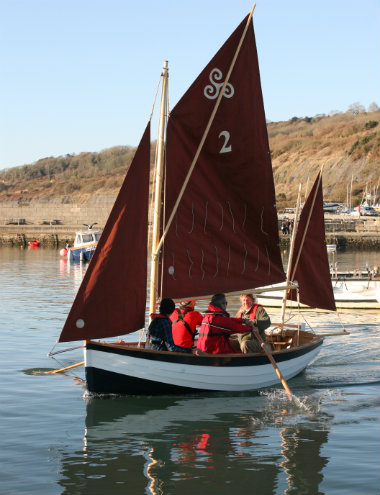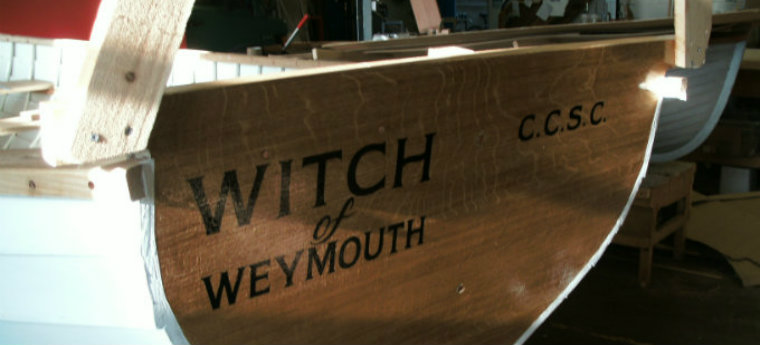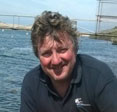A dream come true

Ian Baird describes how a chance conversation and a blind purchase led to him to change tack, abandon office life and become a boat-builder on Dorset’s Jurassic Coast.
My dreary daily journeys up and down the M5 to and from a windowless office near Bristol were punctuated by one highlight only – the view across the Bristol Channel from Portishead Down, where I would sometimes stop and watch the shipping heading for the Celtic Sea and the Atlantic Ocean beyond. These were the beginnings of voyages to who knows where, but each time I saw them, a little piece of my heart went along with them.
And so it was that a speculative visit to the wonderful Boat Building Academy in Lyme Regis decided my fate. No more boring dark office for me! Instead, computers and lofty policies and strategies would be traded for block planes, trammel points and roving dollys, high powered Westminster meetings swapped for a bacon butty and a mug of coffee with my fellow students in a journey of wood and craft under the cobalt-blue Dorset skies. I still watched the shipping from the beach, but this time with more anticipation than hope.
Between these times a chance conversation and a blind purchase brought to pass an epiphany that enriched and changed my life beyond even my expectations.
Rod, an old sailing friend (whose appearance so perfectly fits the stereotype that it defies repetition here), implored me to build a working boat of local provenance. I readily agreed, but research proved that much of this county’s maritime history had been lost and information on local small working boats was scarce, to say the least.
It was then that I found online a book, Working Boats of Britain by Eric Mckee; out of print, relatively uncommon and quite expensive. Somewhat rashly, I decided to purchase it anyway.
A few days later it arrived. I tore open the envelope, set it on the table and randomly opened it near the middle pages. There were the plans and offsets for a sweet little fishing boat, Witch of Worbarrow. “Worbarrow? That’s the ruined fishing village on the Isle of Purbeck!” I thought. I read on…
Witch was the last of the Weymouth Harbour crab and lobster boats, a 14’6” sprit rigged bay boat built in 1902 for the brothers, Jack and Tom Miller, who fished out of Worbarrow Bay until their village was taken over by the Army in 1943 for beach landing practice along with the nearby village of Tyneham, and the inhabitants were evicted, never to return.
The book informed me that the old boat was in the possession of the National Maritime Museum. A quick phone call to the ever helpful and generous Andy Wyke, boat manager at the Museum, and I was in the car beating a path to Falmouth to see Witch armed with a camera, tape measure, pencils and paper. The means to recreate this lovely old boat was now truly in my hands.

With the expert guidance of the instructors at Lyme a new boat began to take shape – as did a new man. Together we grew and changed and took on different forms to what we had been before – more, perhaps, than the sum of our parts – until on a bright December day under that same cobalt sky, Witch of Weymouth was launched and along with her, a new life for me and my family.
It hasn’t been easy. Money has been tight but then you can’t worry about something you haven’t got. A detached cottage in the countryside has been traded for a tiny terraced fisherman’s cottage on the Isle of Portland overlooking the sea. Life is simpler, life is good. Witch of Weymouth and I go out on the ocean, both to gather food, the freshest of fish that this wonderful coastline can offer, and for fun, pottering around the harbour or for Swallows and Amazons style trips up the Fleet.
Despite being a beamy pot boat she is wonderfully responsive on the water, skipping along under her oars or pointing her bow towards the horizon with Gully, the old Seagull outboard fastened to her beautiful oak transom. The sailing rig still needs a bit of tweaking, but there’s plenty of time…
One day, I have promised her, we’re going to stretch our legs and go across the bay to Worbarrow, maybe for a sleep on the beach. And I fervently hope that the ghosts of old Jack and Tom will come down and join us, to spin a yarn or two about the old days, working out across the bay with their pots under that same mesmerising sky.
After studying at Lyme Regis, Ian Baird passed his Diploma with Distinction and became a self-employed boat builder on Dorset’s Jurassic Coast. He continues to work on interesting old boats but also has a workshop where he makes all kinds of nauticalia both from new and recycled materials, especially native woods. Never one to let an opportunity pass, he also manages a coppice woodland in Dorset for conservation and greenwood forestry products as well as The Galley Cafe Mobile Canteen with his friend, chef Keian Gillett of the Galley Cafe in Lyme Regis, offering fishy treats to hungry Dorset folk.






